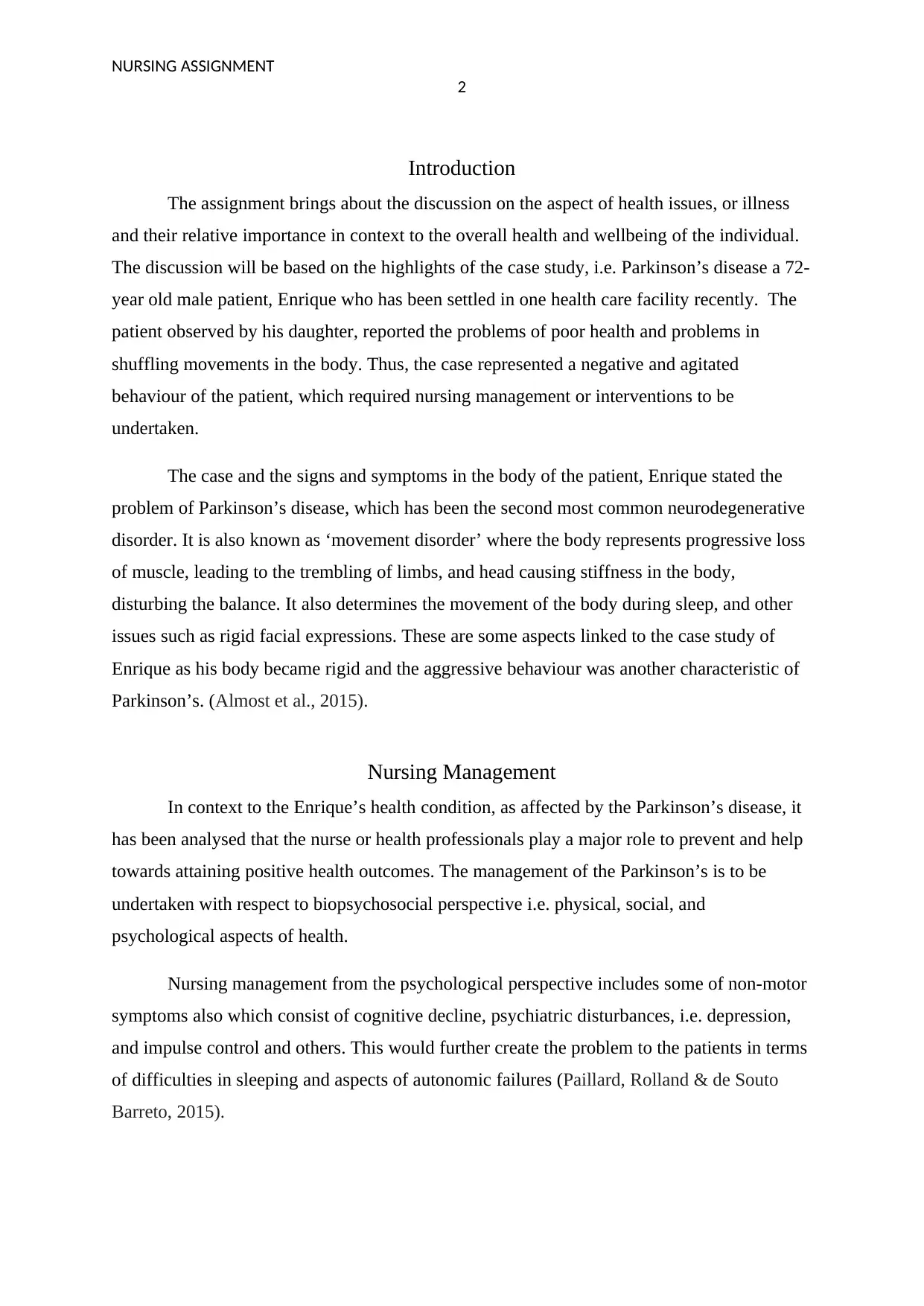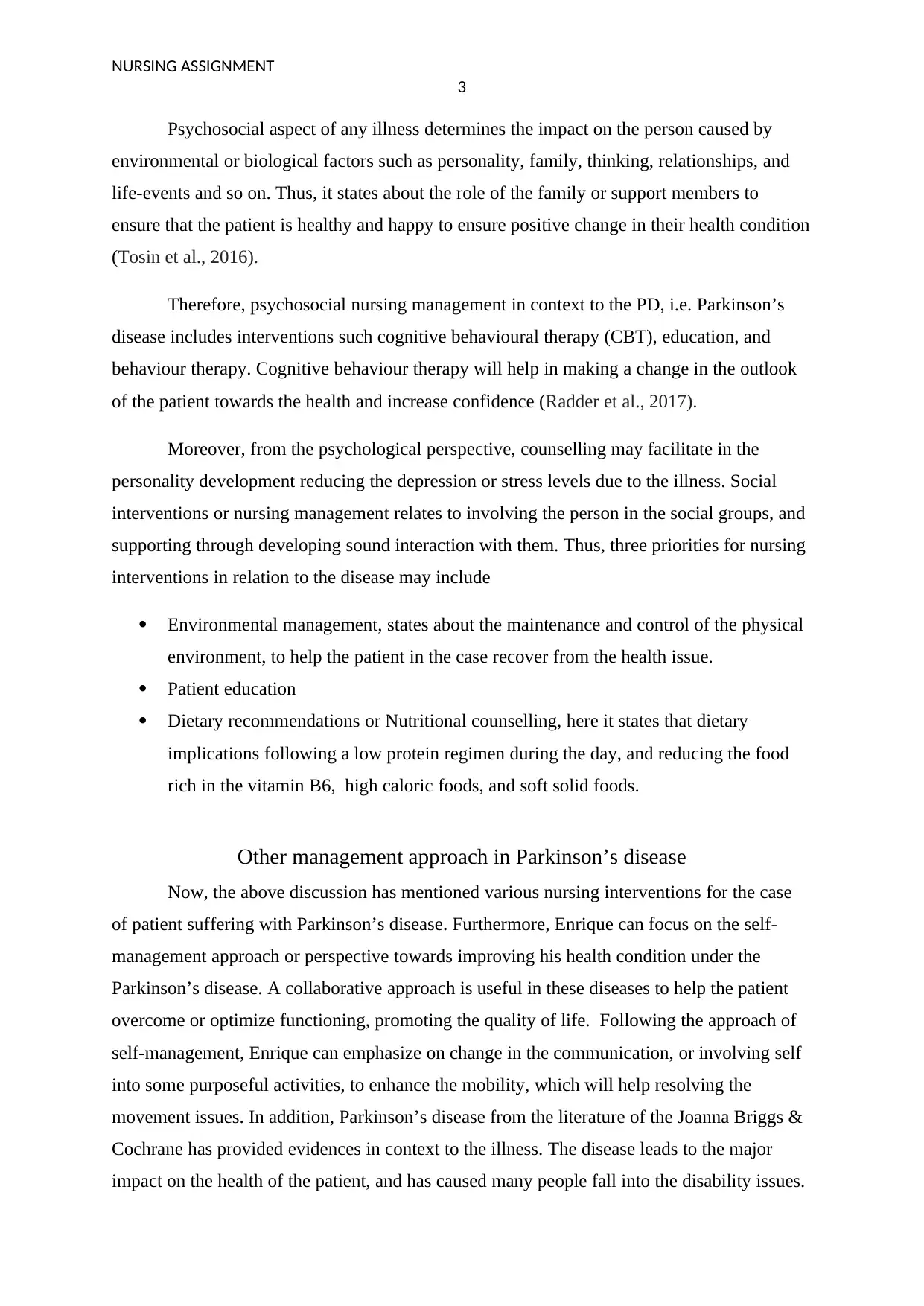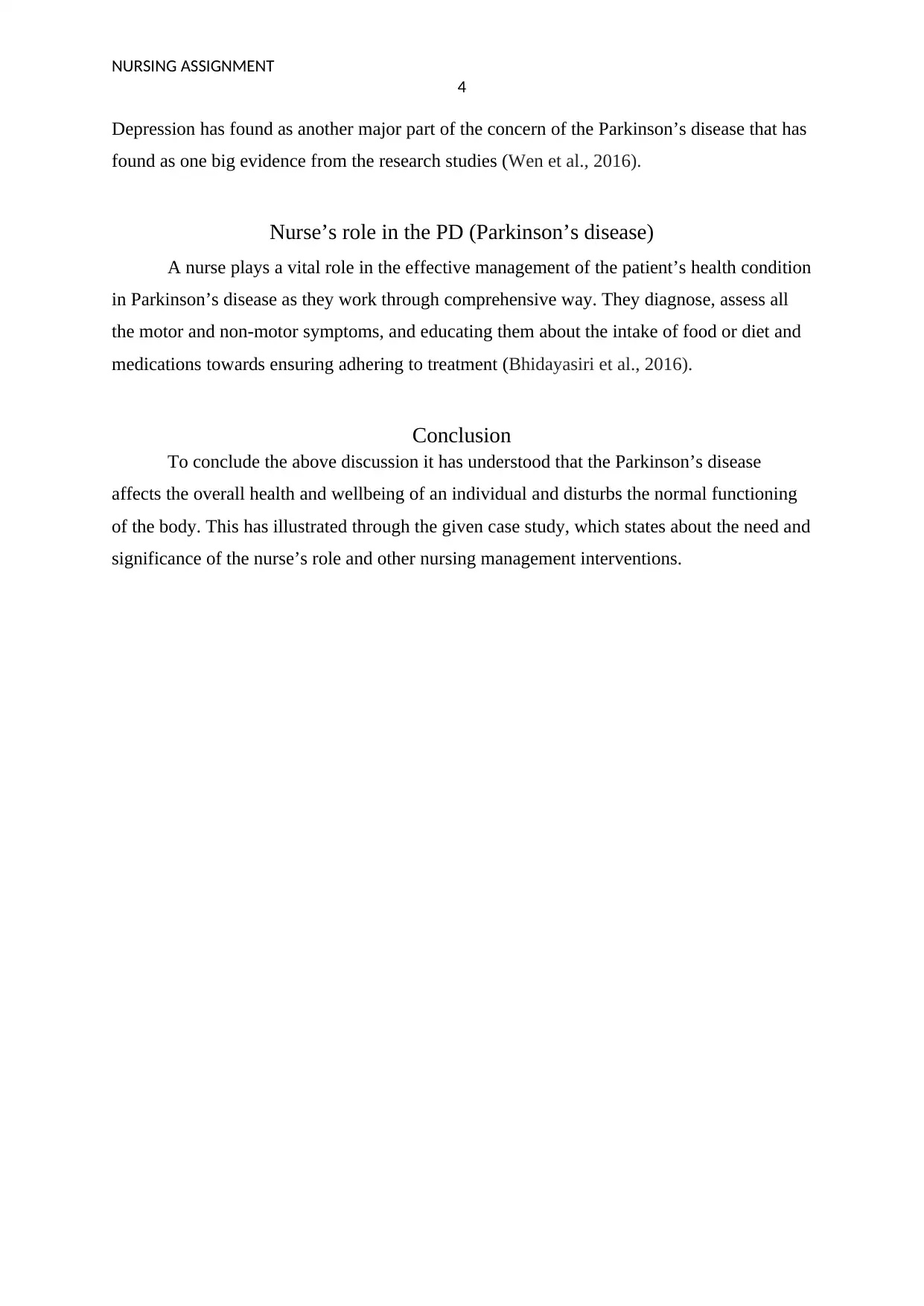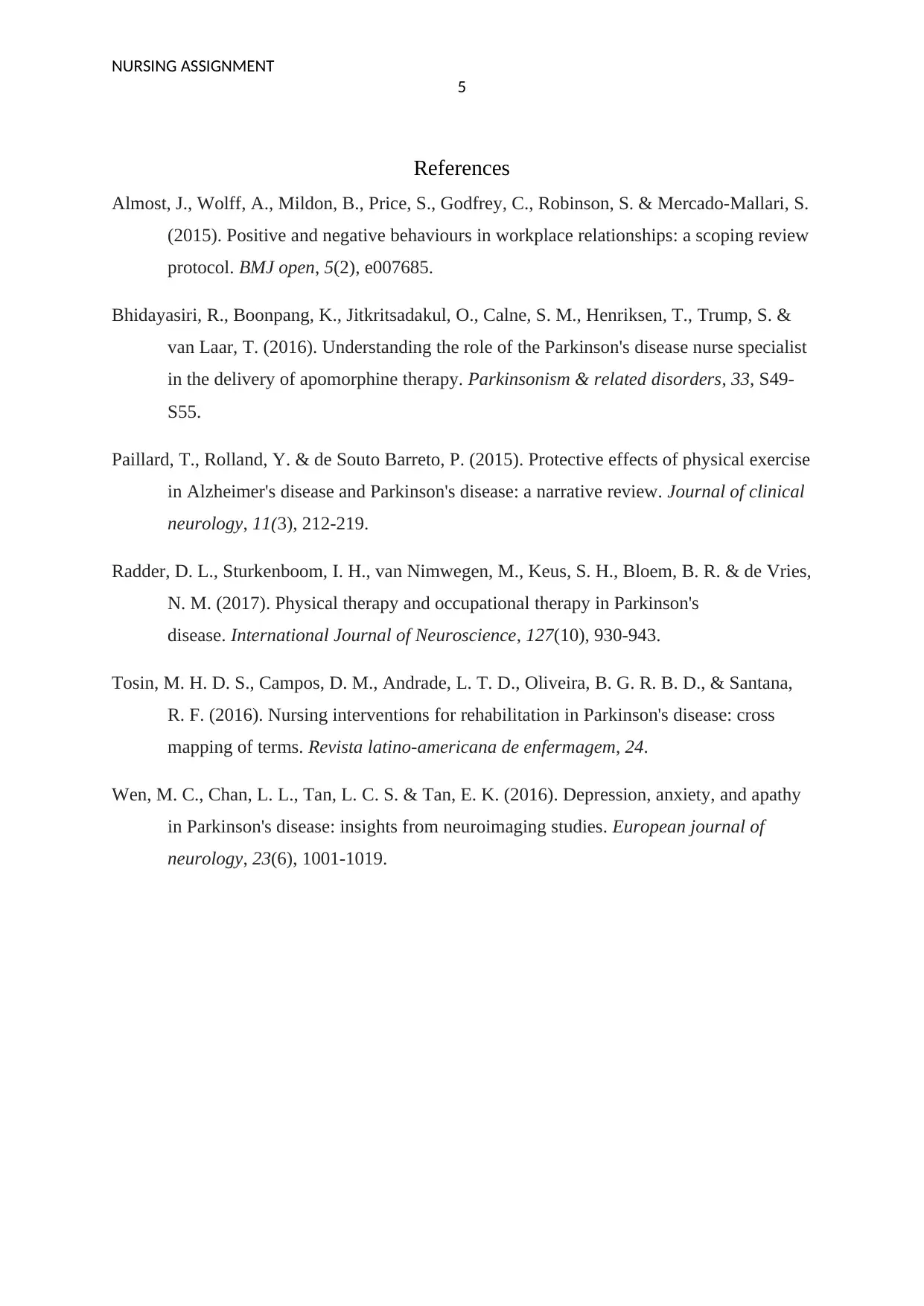Nursing Assignment: Biopsychosocial Management of Parkinson's Disease
VerifiedAdded on 2023/01/12
|6
|1369
|72
Report
AI Summary
This nursing assignment addresses the case of a 72-year-old male, Enrique, recently admitted to an aged care facility with Parkinson's disease. The report focuses on nursing management from a biopsychosocial perspective, encompassing physical, psychological, and social aspects. It identifies key nursing interventions, including environmental management, patient education, and dietary recommendations, while also exploring other management approaches such as self-management strategies and cognitive behavioral therapy. The assignment emphasizes the nurse's crucial role in providing collaborative care for optimal patient outcomes, referencing evidence-based practices from resources like Joanna Briggs & Cochrane to support comprehensive care. The report concludes by highlighting the impact of Parkinson's disease on an individual's overall well-being and emphasizes the significance of nursing interventions in managing the condition effectively.

Running Head: NURSING ASSIGNMENT
0
Nursing
4/1/2019
0
Nursing
4/1/2019
Paraphrase This Document
Need a fresh take? Get an instant paraphrase of this document with our AI Paraphraser

NURSING ASSIGNMENT
1
Contents
Introduction...........................................................................................................................................2
Nursing Management............................................................................................................................2
Other management approach in Parkinson’s disease.............................................................................3
Nurse’s role in the PD (Parkinson’s disease).........................................................................................4
Conclusion.............................................................................................................................................4
References.............................................................................................................................................5
1
Contents
Introduction...........................................................................................................................................2
Nursing Management............................................................................................................................2
Other management approach in Parkinson’s disease.............................................................................3
Nurse’s role in the PD (Parkinson’s disease).........................................................................................4
Conclusion.............................................................................................................................................4
References.............................................................................................................................................5

NURSING ASSIGNMENT
2
Introduction
The assignment brings about the discussion on the aspect of health issues, or illness
and their relative importance in context to the overall health and wellbeing of the individual.
The discussion will be based on the highlights of the case study, i.e. Parkinson’s disease a 72-
year old male patient, Enrique who has been settled in one health care facility recently. The
patient observed by his daughter, reported the problems of poor health and problems in
shuffling movements in the body. Thus, the case represented a negative and agitated
behaviour of the patient, which required nursing management or interventions to be
undertaken.
The case and the signs and symptoms in the body of the patient, Enrique stated the
problem of Parkinson’s disease, which has been the second most common neurodegenerative
disorder. It is also known as ‘movement disorder’ where the body represents progressive loss
of muscle, leading to the trembling of limbs, and head causing stiffness in the body,
disturbing the balance. It also determines the movement of the body during sleep, and other
issues such as rigid facial expressions. These are some aspects linked to the case study of
Enrique as his body became rigid and the aggressive behaviour was another characteristic of
Parkinson’s. (Almost et al., 2015).
Nursing Management
In context to the Enrique’s health condition, as affected by the Parkinson’s disease, it
has been analysed that the nurse or health professionals play a major role to prevent and help
towards attaining positive health outcomes. The management of the Parkinson’s is to be
undertaken with respect to biopsychosocial perspective i.e. physical, social, and
psychological aspects of health.
Nursing management from the psychological perspective includes some of non-motor
symptoms also which consist of cognitive decline, psychiatric disturbances, i.e. depression,
and impulse control and others. This would further create the problem to the patients in terms
of difficulties in sleeping and aspects of autonomic failures (Paillard, Rolland & de Souto
Barreto, 2015).
2
Introduction
The assignment brings about the discussion on the aspect of health issues, or illness
and their relative importance in context to the overall health and wellbeing of the individual.
The discussion will be based on the highlights of the case study, i.e. Parkinson’s disease a 72-
year old male patient, Enrique who has been settled in one health care facility recently. The
patient observed by his daughter, reported the problems of poor health and problems in
shuffling movements in the body. Thus, the case represented a negative and agitated
behaviour of the patient, which required nursing management or interventions to be
undertaken.
The case and the signs and symptoms in the body of the patient, Enrique stated the
problem of Parkinson’s disease, which has been the second most common neurodegenerative
disorder. It is also known as ‘movement disorder’ where the body represents progressive loss
of muscle, leading to the trembling of limbs, and head causing stiffness in the body,
disturbing the balance. It also determines the movement of the body during sleep, and other
issues such as rigid facial expressions. These are some aspects linked to the case study of
Enrique as his body became rigid and the aggressive behaviour was another characteristic of
Parkinson’s. (Almost et al., 2015).
Nursing Management
In context to the Enrique’s health condition, as affected by the Parkinson’s disease, it
has been analysed that the nurse or health professionals play a major role to prevent and help
towards attaining positive health outcomes. The management of the Parkinson’s is to be
undertaken with respect to biopsychosocial perspective i.e. physical, social, and
psychological aspects of health.
Nursing management from the psychological perspective includes some of non-motor
symptoms also which consist of cognitive decline, psychiatric disturbances, i.e. depression,
and impulse control and others. This would further create the problem to the patients in terms
of difficulties in sleeping and aspects of autonomic failures (Paillard, Rolland & de Souto
Barreto, 2015).
⊘ This is a preview!⊘
Do you want full access?
Subscribe today to unlock all pages.

Trusted by 1+ million students worldwide

NURSING ASSIGNMENT
3
Psychosocial aspect of any illness determines the impact on the person caused by
environmental or biological factors such as personality, family, thinking, relationships, and
life-events and so on. Thus, it states about the role of the family or support members to
ensure that the patient is healthy and happy to ensure positive change in their health condition
(Tosin et al., 2016).
Therefore, psychosocial nursing management in context to the PD, i.e. Parkinson’s
disease includes interventions such cognitive behavioural therapy (CBT), education, and
behaviour therapy. Cognitive behaviour therapy will help in making a change in the outlook
of the patient towards the health and increase confidence (Radder et al., 2017).
Moreover, from the psychological perspective, counselling may facilitate in the
personality development reducing the depression or stress levels due to the illness. Social
interventions or nursing management relates to involving the person in the social groups, and
supporting through developing sound interaction with them. Thus, three priorities for nursing
interventions in relation to the disease may include
Environmental management, states about the maintenance and control of the physical
environment, to help the patient in the case recover from the health issue.
Patient education
Dietary recommendations or Nutritional counselling, here it states that dietary
implications following a low protein regimen during the day, and reducing the food
rich in the vitamin B6, high caloric foods, and soft solid foods.
Other management approach in Parkinson’s disease
Now, the above discussion has mentioned various nursing interventions for the case
of patient suffering with Parkinson’s disease. Furthermore, Enrique can focus on the self-
management approach or perspective towards improving his health condition under the
Parkinson’s disease. A collaborative approach is useful in these diseases to help the patient
overcome or optimize functioning, promoting the quality of life. Following the approach of
self-management, Enrique can emphasize on change in the communication, or involving self
into some purposeful activities, to enhance the mobility, which will help resolving the
movement issues. In addition, Parkinson’s disease from the literature of the Joanna Briggs &
Cochrane has provided evidences in context to the illness. The disease leads to the major
impact on the health of the patient, and has caused many people fall into the disability issues.
3
Psychosocial aspect of any illness determines the impact on the person caused by
environmental or biological factors such as personality, family, thinking, relationships, and
life-events and so on. Thus, it states about the role of the family or support members to
ensure that the patient is healthy and happy to ensure positive change in their health condition
(Tosin et al., 2016).
Therefore, psychosocial nursing management in context to the PD, i.e. Parkinson’s
disease includes interventions such cognitive behavioural therapy (CBT), education, and
behaviour therapy. Cognitive behaviour therapy will help in making a change in the outlook
of the patient towards the health and increase confidence (Radder et al., 2017).
Moreover, from the psychological perspective, counselling may facilitate in the
personality development reducing the depression or stress levels due to the illness. Social
interventions or nursing management relates to involving the person in the social groups, and
supporting through developing sound interaction with them. Thus, three priorities for nursing
interventions in relation to the disease may include
Environmental management, states about the maintenance and control of the physical
environment, to help the patient in the case recover from the health issue.
Patient education
Dietary recommendations or Nutritional counselling, here it states that dietary
implications following a low protein regimen during the day, and reducing the food
rich in the vitamin B6, high caloric foods, and soft solid foods.
Other management approach in Parkinson’s disease
Now, the above discussion has mentioned various nursing interventions for the case
of patient suffering with Parkinson’s disease. Furthermore, Enrique can focus on the self-
management approach or perspective towards improving his health condition under the
Parkinson’s disease. A collaborative approach is useful in these diseases to help the patient
overcome or optimize functioning, promoting the quality of life. Following the approach of
self-management, Enrique can emphasize on change in the communication, or involving self
into some purposeful activities, to enhance the mobility, which will help resolving the
movement issues. In addition, Parkinson’s disease from the literature of the Joanna Briggs &
Cochrane has provided evidences in context to the illness. The disease leads to the major
impact on the health of the patient, and has caused many people fall into the disability issues.
Paraphrase This Document
Need a fresh take? Get an instant paraphrase of this document with our AI Paraphraser

NURSING ASSIGNMENT
4
Depression has found as another major part of the concern of the Parkinson’s disease that has
found as one big evidence from the research studies (Wen et al., 2016).
Nurse’s role in the PD (Parkinson’s disease)
A nurse plays a vital role in the effective management of the patient’s health condition
in Parkinson’s disease as they work through comprehensive way. They diagnose, assess all
the motor and non-motor symptoms, and educating them about the intake of food or diet and
medications towards ensuring adhering to treatment (Bhidayasiri et al., 2016).
Conclusion
To conclude the above discussion it has understood that the Parkinson’s disease
affects the overall health and wellbeing of an individual and disturbs the normal functioning
of the body. This has illustrated through the given case study, which states about the need and
significance of the nurse’s role and other nursing management interventions.
4
Depression has found as another major part of the concern of the Parkinson’s disease that has
found as one big evidence from the research studies (Wen et al., 2016).
Nurse’s role in the PD (Parkinson’s disease)
A nurse plays a vital role in the effective management of the patient’s health condition
in Parkinson’s disease as they work through comprehensive way. They diagnose, assess all
the motor and non-motor symptoms, and educating them about the intake of food or diet and
medications towards ensuring adhering to treatment (Bhidayasiri et al., 2016).
Conclusion
To conclude the above discussion it has understood that the Parkinson’s disease
affects the overall health and wellbeing of an individual and disturbs the normal functioning
of the body. This has illustrated through the given case study, which states about the need and
significance of the nurse’s role and other nursing management interventions.

NURSING ASSIGNMENT
5
References
Almost, J., Wolff, A., Mildon, B., Price, S., Godfrey, C., Robinson, S. & Mercado-Mallari, S.
(2015). Positive and negative behaviours in workplace relationships: a scoping review
protocol. BMJ open, 5(2), e007685.
Bhidayasiri, R., Boonpang, K., Jitkritsadakul, O., Calne, S. M., Henriksen, T., Trump, S. &
van Laar, T. (2016). Understanding the role of the Parkinson's disease nurse specialist
in the delivery of apomorphine therapy. Parkinsonism & related disorders, 33, S49-
S55.
Paillard, T., Rolland, Y. & de Souto Barreto, P. (2015). Protective effects of physical exercise
in Alzheimer's disease and Parkinson's disease: a narrative review. Journal of clinical
neurology, 11(3), 212-219.
Radder, D. L., Sturkenboom, I. H., van Nimwegen, M., Keus, S. H., Bloem, B. R. & de Vries,
N. M. (2017). Physical therapy and occupational therapy in Parkinson's
disease. International Journal of Neuroscience, 127(10), 930-943.
Tosin, M. H. D. S., Campos, D. M., Andrade, L. T. D., Oliveira, B. G. R. B. D., & Santana,
R. F. (2016). Nursing interventions for rehabilitation in Parkinson's disease: cross
mapping of terms. Revista latino-americana de enfermagem, 24.
Wen, M. C., Chan, L. L., Tan, L. C. S. & Tan, E. K. (2016). Depression, anxiety, and apathy
in Parkinson's disease: insights from neuroimaging studies. European journal of
neurology, 23(6), 1001-1019.
5
References
Almost, J., Wolff, A., Mildon, B., Price, S., Godfrey, C., Robinson, S. & Mercado-Mallari, S.
(2015). Positive and negative behaviours in workplace relationships: a scoping review
protocol. BMJ open, 5(2), e007685.
Bhidayasiri, R., Boonpang, K., Jitkritsadakul, O., Calne, S. M., Henriksen, T., Trump, S. &
van Laar, T. (2016). Understanding the role of the Parkinson's disease nurse specialist
in the delivery of apomorphine therapy. Parkinsonism & related disorders, 33, S49-
S55.
Paillard, T., Rolland, Y. & de Souto Barreto, P. (2015). Protective effects of physical exercise
in Alzheimer's disease and Parkinson's disease: a narrative review. Journal of clinical
neurology, 11(3), 212-219.
Radder, D. L., Sturkenboom, I. H., van Nimwegen, M., Keus, S. H., Bloem, B. R. & de Vries,
N. M. (2017). Physical therapy and occupational therapy in Parkinson's
disease. International Journal of Neuroscience, 127(10), 930-943.
Tosin, M. H. D. S., Campos, D. M., Andrade, L. T. D., Oliveira, B. G. R. B. D., & Santana,
R. F. (2016). Nursing interventions for rehabilitation in Parkinson's disease: cross
mapping of terms. Revista latino-americana de enfermagem, 24.
Wen, M. C., Chan, L. L., Tan, L. C. S. & Tan, E. K. (2016). Depression, anxiety, and apathy
in Parkinson's disease: insights from neuroimaging studies. European journal of
neurology, 23(6), 1001-1019.
⊘ This is a preview!⊘
Do you want full access?
Subscribe today to unlock all pages.

Trusted by 1+ million students worldwide
1 out of 6
Related Documents
Your All-in-One AI-Powered Toolkit for Academic Success.
+13062052269
info@desklib.com
Available 24*7 on WhatsApp / Email
![[object Object]](/_next/static/media/star-bottom.7253800d.svg)
Unlock your academic potential
Copyright © 2020–2025 A2Z Services. All Rights Reserved. Developed and managed by ZUCOL.





